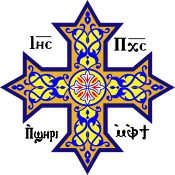Coptology
| Part of a series on the |
| Copts |
|---|
| Culture |
|
| Regions |
| Denominations |
|
|


Coptology is the scientific study of the Coptic people.
Origin
The European interest in Coptology may have started as early as the 15th century AD.[1] The term was used in 1976 when the First International Congress of Coptology was held in Cairo under the title "Colloquium on the Future of Coptic Studies" (11-17 December). This was followed by the establishment of the "International Association for Coptic Studies".[2] One of the founders of the Colloquium and the Association was Pahor Labib, director of the Coptic Museum in Cairo during 1951-65. The words 'Coptology' and 'Coptologist' were introduced into the English language by Aziz Suryal Atiya.[3]
Worldwide institutions
There are now institutions that give more or less regular courses of Coptology in 47 countries around the world, including Australia, Great Britain, Canada, Germany, Israel, Spain, Switzerland, and the United States. A rotating chair of Coptic studies was opened at the American University in Cairo in 2002.[4]
Divisions
Journals
- Coptologia Publications - Journal of Coptic Thought and Spirituality
- Journal of Coptic Studies
- Göttinger Miszellen
Prominent Coptologists
- Aziz Suryal Atiya
- O. H. E. Burmester
- Christian Cannuyer
- Walter Ewing Crum
- Iris Habib Elmasry
- Stephen Emmel
- Nabila Erian
- Gawdat Gabra
- Rodolphe Kasser
- Pahor Labib
- Otto Friedrich August Meinardus
- Jozef Vergote
- Hilde Zaloscer
See also
- Coptic history
- Coptic Museum
- Coptic Egypt: The Christians of the Nile
- Institute of Coptic Studies
- Egyptology
References
- ^ Hamilton, Alastair (2006-07-27). The Copts and the West, 1439-1822: The European Discovery of the Egyptian Church. OUP Oxford. ISBN 9780199288779.
- ^ International Association for Coptic Studies Archived 2011-02-01 at the Wayback Machine
- ^ "Amazon.com: Online Shopping for Electronics, Apparel, Computers, Books, DVDs & more". Retrieved 2015-12-02.
- ^ What is Coptology?, Al-Ahram Weekly Archived September 17, 2007, at the Wayback Machine
External links
- International Association for Coptic Studies
- موقع الدراسات القبطية والأرثوذكسية
